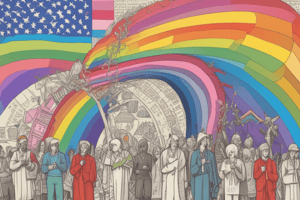Podcast
Questions and Answers
What does Marshall suggest about mechanization?
What does Marshall suggest about mechanization?
Mechanization will lead to an end to the working classes, as their labor will become unnecessary.
How does Marshall define citizenship?
How does Marshall define citizenship?
Citizenship is a status bestowed on those who are full members of a community and all who possess this status are equal with respect to rights and duties.
What are the three elements of citizenship according to Marshall?
What are the three elements of citizenship according to Marshall?
What are subsistence rights?
What are subsistence rights?
Signup and view all the answers
How does Marshall view education in relation to citizenship?
How does Marshall view education in relation to citizenship?
Signup and view all the answers
According to Marshall, citizenship is a system of inequality.
According to Marshall, citizenship is a system of inequality.
Signup and view all the answers
What does the U.S. have in terms of social rights?
What does the U.S. have in terms of social rights?
Signup and view all the answers
Study Notes
Mechanization and the Working Class
- Mechanization threatens the existence of the working class by rendering their labor unnecessary.
Concept of Citizenship
- Citizenship is a status that signifies full membership in a community, where all members possess equal rights and duties.
- It represents a mature way of life that evolves over time, rather than being solely dictated by the state.
- Citizenship is progressing towards achieving social equality.
Elements of Citizenship
-
Civil Rights: Essential for personal freedom, encompassing:
- Liberty of the person
- Freedom of speech, thought, and faith
- Right to own property and engage in valid contracts
- Right to justice
- Associated institution: court of justice
-
Political Rights: Involves participation in political power through:
- Membership in elected bodies or voting for them
- Associated institutions: parliament and local government councils
-
Social Rights: Encompasses:
- Economic welfare and security
- Right to participate fully in societal heritage and live according to societal standards
- Associated institutions: educational system and social services
Subsistence Rights
- Define the right to an adequate standard of living, ensuring at least a minimum outcome rather than equality of outcomes.
Education and Citizenship
- Education is framed as a right of adult citizens, highlighting the importance of being educated rather than merely the child's right to attend school.
Citizenship vs. Social Class
- Citizenship is characterized by equality among members of society.
- Social class represents a system of inequality, often showing a significant disparity between a small wealthy elite and a large underprivileged class.
Social Rights in the U.S.
- The U.S. offers minimal social rights, primarily limited to:
- Basic health insurance coverage
- Few welfare and housing subsidies
- Social rights observed include social security and education available up to grade 12.
Studying That Suits You
Use AI to generate personalized quizzes and flashcards to suit your learning preferences.
Description
This quiz focuses on the concepts introduced by Marshall regarding mechanization and citizenship. It explores his views on the implications of mechanization for the working class and the definition of citizenship as a social status. Test your understanding of these key ideas in social theory.



